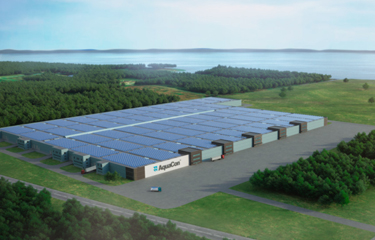Oslo, Norway-based aquaculture firm AquaCon has withdrawn its permit application for a planned recirculating aquaculture system (RAS) farm in Federalsburg, Maryland, U.S.A., which would have produced up to 15,000 metric tons of Atlantic salmon annually and cost an estimated USD 300 million (EUR 304.8 million) to build.
In a statement issued Friday, 14 October, AquaCon said it had withdrawn its application to the Maryland Department of the Environment (MDE) that would have allowed it to discharge up to 2.3 million gallons of treated water daily into Marshyhope Creek.
The company, which has received backing from AKVA, Nutreco, and Israel Corp, withdrew its permit request following a 19 September public meeting where it encountered opposition from residents who opposed discharge into the creek, which is a spawning ground for endangered Atlantic sturgeon. On 3 October, Federalsburg Mayor Kimberly J. Abner and the Council of Federalsburg joined that opposition, sending a letter to MDE asking that it deny the company’s application, according to The Star-Democrat. That led AquaCon to pull its application, as it worried MDE would reverse its initial approval of the permit in August 2022.
“AquaCon sincerely appreciates MDE’s evaluation of our project to date and looks forward to continuing to work with MDE to secure permits that authorize aquacultural production while protecting the water quality and health of the bay ecosystem,” AquaCon CEO Pål Haldorsen said.
In a statement, the Chesapeake Bay Foundation, which advocates for environmental protection of the Chesapeake Bay, celebrated the withdrawal – but also critized the regulatory process.
“We’re pleased AquaCon withdrew its discharge permit application. However, it shouldn’t have gotten this far. We urge MDE to more closely vet such significant – and in this case, deficient – proposals before bringing up a permit for public review. It took a united effort by environmental organizations, concerned scientists, and community residents to ensure Marshyhope Creek and its small population of endangered Atlantic sturgeon were protected from AquaCon's half-baked Federalsburg fish factory proposal,” CBF Eastern Shore Director Alan Girard said. “Throughout the public discharge permit review process, details about the company’s proposed salmon factory changed, including the size of the facility, what types of operations would take place inside it, and from where it would withdraw the massive amounts of water it needed to operate. Those changing details led CBF and others to question how MDE could have adequately drafted the proposed discharge permit in the first place. As AquaCon assesses other potential Maryland locations for a future facility, we ask MDE to rigorously evaluate potential wildlife, environmental, and community concerns before the public review process.”
AquaCon is planning multiple RAS facilities in the U.S. Mid-Atlantic, with a production volume target of 50,000 metric tons by 2028, according to the company. Specifically it has said it wants to build three more facilities in Maryland’s Caroline and Dorchester counties, though it has abandoned plans to build a farm in Cambridge, Maryland, after being denied a zoning variance, and a company representative said AquaCon is also not pursuing a site where it had previously expressed interest in Denton, Maryland, according to the Chesapeake Bay Journal.
AquaCon attorney Ryan Showalter told the newspaper the company has not given up on the Federalsburg site, saying that the company withdrew its application in order to reassess the facility’s potential impacts on sturgeon.
The MDE had extended the public comment period on AquaCon’s permit application for 60 days after the August hearing as a means of accommodating obtaining feedback from potentially affected parties, after noting elevated public interest in the project, MDE spokesman Jay Apperson told the Journal.
“While the location of the proposed facility has represented a unique challenge, aquaculture is a safe way to raise sustainable food,” Apperson said. “The department is committed to continued innovation and economic growth in this field while ensuring all necessary safeguards are in place to protect the environment and public health.”
Photo courtesy of Christina Nichole/Shutterstock







